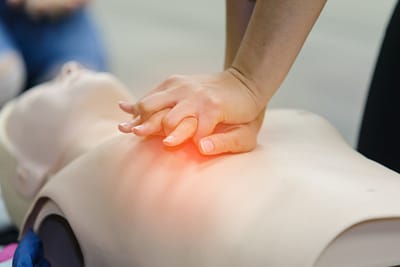
-
- Misconception: A heart attack and cardiac arrest are the same thing. These are different conditions that require different treatments. Heart attacks occur when one of the coronary arteries becomes blocked; the heart muscle is still pumping, it just isn’t receiving enough oxygen. In a cardiac arrest, the heart has stopped pumping completely; they stop breathing and oxygen is not circulating at all.
- Misconception: You’re not supposed to perform CPR if you haven’t been trained. If a person is experiencing cardiac arrest, your intervention is their only hope; a victim’s chances of survival decreases 7% for every minute that CPR is delayed. Ambulance dispatches and 911 operators can provide instructions on how to carry out chest compressions over the phone. Because cardiac arrest patients are technically already dead, your efforts — no matter how incorrect — can only help them
- Misconception: You do not need to perform rescue breaths when performing CPR. The purpose of CPR is to aid in maintaining vital flow of blood that to the brain and heart. While someone who has suffered a cardiac arrest will still have three or four minutes’ worth of oxygenated blood in their system that chest compressions will help circulate, they will run out of that oxygen eventually. After this brief period of time, it’s vital that you breathe for them so they receive new oxygen; generally speaking, two rescue breaths should be given after every 30 compressions.
The best way to educate yourself on these matters is by taking CPR classes; when you commit to first aid training and acquire your CPR certification, you’ll always be informed and ready to leap into action if the need arises. Remember, CPR could be the reason that you save someone’s life; sign up for CPR classes today.



